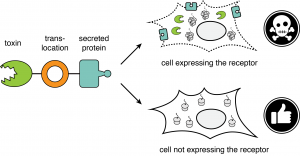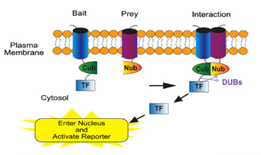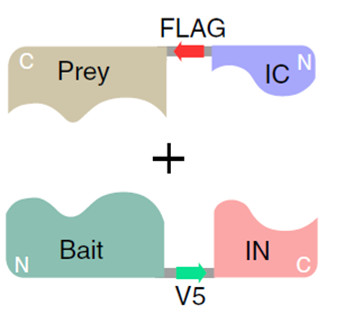Mammalian Membrane Two-Hybrid (MaMTH) Technology: a Novel Protein Interaction and Drug Discovery Tool
Complex multi-protein clusters play vital roles in many aspects of biology. Deregulation of these clusters may lead to several human diseases including cancer, cystic fibrosis, cardiovascular and neurodegenerative disorders. This technology uses a bait (protein of interest) - prey (candidate molecules) system to detect and identify novel interacting partners in a mammalian genetic system. Dr Stagljar has built upon his initial patented Membrane Yeast Two-Hybrid (MYTH) invention to propose a unique platform to discover new target molecules for research and drug development purposes. This technology provides a new tool to examine membrane proteins in their natural environment of the human cell. It is sensitive enough to detect minor changes upon the introduction of drugs and thus should prove useful in the development of therapeutics, especially for cancer and neurological diseases.
Read more...Keywords:
Screening Platform, Research ToolsCRISPR-Based Screening Platform Technology for Drug Discovery
This technology relates to a novel method to discover receptors for extracellular proteins in an unbiased fashion. The approach is based on a simple concept: bacterial exotoxin, when fused to a secreted protein, intoxicates cells in a receptor-dependent manner, which facilitates the identification of the cognate receptor through genome-wide CRISPR/Cas9-based positive selection screen.
Read more...Keywords:
Screening Platform, Research ToolsImmunotyping COVID-19 Patients Using Novel Protein Complementation-Based Assay
Motivated by the current urgency due to the pandemic, University of Toronto researchers (with extensive expertise in protein engineering) are developing a set of novel immunoassays for detecting anti-CoV-2 antibodies (IgM and IgG) directly in patients sera based on protein complementation assay (PCA), specifically on tri-part split NanoLuc. For this, they are repurposing their recently developed and patented Split Intein-Mediated Protein Ligation (SIMPL) (1) detection assay to develop an innovative diagnostic immunoassay for detecting anti-SARS-CoV-2 Abs directly from COVID-19 patient sera by adapting the tri-part split NanoLuc assay.
Read more...Keywords:
Research Tools, Screening PlatformNovel Compounds for Drug-resistant NSCLC Treatment Identified using a Novel Assay
Lung cancer is one of the most common and deadliest cancers worldwide, with an estimated 1.7 million new cases reported annually. Approximately 85% of cases are non-small cell lung cancer (NSCLC), of which 17-78% (depending on geographic region) contain activating mutations in the receptor tyrosine kinase (RTK) epidermal growth factor receptor (EGFR), with the majority of these mutations corresponding to in-frame deletions in exon19 (ex19del) or a leucine to arginine substitution at amino acid position 858 (L858R). Oncogenic addiction of tumors to these mutant receptors has led to the development and approval of several generations of successful tyrosine kinase inhibitor (TKI) therapeutics (which specifically target the kinase activity of oncogenic EGFR) for treatment of patients with metastatic NSLCLC. Unfortunately, patients undergoing treatment frequently acquire resistance to these drugs, often through the overexpression of other RTKs or additional mutations in EGFR. For instance, almost 50% of patients treated with the third generation TKI Osimertinib acquire an additional mutation (C797S) that mediates resistance to the drug, and there are currently no approved targeted therapeutic options for patients with this common form of NSCLC. Novel drugs for treatment of patients with mutant EGFR-mediated NSCLC are therefore urgently needed, including both new TKIs and compounds with novel modes of action less susceptible to the development of drug resistance.
Read more...Keywords:
Screening PlatformDetermining Protein-Protein-Interactions for Target Identification and Drug Screening
Protein-protein interactions (PPIs) govern many cellular processes and play a crucial role in organism function. There are estimated to be between 130,000-600,000 types of PPIs in the human ‘interactome’. Aberrant interactions have been linked to various diseases like cancer, infectious and neurodegenerative diseases. As such, the identification and modulation of PPIs is an attractive approach to the development of new drugs. There are several techniques available (LuTHy, LUMIER, MAPPIT, KISS, Yeast Two-Hybrid (YTH), PCA, and NAPPA) for the identification of PPIs and these can often be also utilized for drug screening. However, all of them exhibit certain biases that prevent coverage across the human ‘interactome’, thus necessitating the development of complementary techniques.
Read more...








